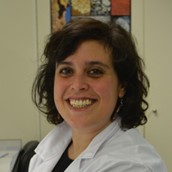
Supervisors: Dr. Susanna Pecchia and Prof. Claudio Pugliesi
Research field: Plant Pathology
Research interests: Plant Pathology, Molecular Biology, RNA interference, Nanoparticles
![]() Department head office, via del Borghetto, 80, Pisa
Department head office, via del Borghetto, 80, Pisa
![]() maria.spada@phd.unipi.it
maria.spada@phd.unipi.it
PhD Student at the Department of Agriculture, Food and Environment, University of Pisa, with the research project ‘Botrytis cinerea – Lactuca sativa pathosystem: nanoparticles-mediated delivery of dsRNA in Spray-Induced Gene Silencing (SIGS) for plant disease control’.
Erasmus+ after graduation scholarship and PhD mobility stay at the Instituto de Biologìa molecular y celular de plantas (IBMCP), at Universidad Politécnica de Valencia, Spain. During this abroad stay periods the research work was conducted on: (i) the use of a viroid-based system for the production of double-stranded RNA with potential use in plant disease control by RNA interference, (ii) the use of CRISPR/Cas as a ribonucleoprotein (RNP) for editing the melon genome and to regenerate edited plants, (iii) the generation and in vivo analysis of artificial microRNA (amiRNA) constructs aimed to induce resistance against Tomato leaf curl New Delhi virus in Nicotiana benthamiana, (iv) the production of amiRNA and synthetic trans-acting small interfering RNA (syn-tasiRNA) constructs aimed to silence N. benthamiana endogenous genes.
Master degree in Plant and Microbial Biotechnologies at the Department of Agriculture, Food and Environment, University of Pisa, with the final project ‘Fungal mediated extracellular biosynthesis of gold and silver nanoparticles and their effectiveness against seed-borne pathogens’. Bachelor degree in Agro-Industrial Biotechnologies, at the Department of Agriculture, Food and Environment, University of Pisa, with the final project ‘Production and qualitative evaluation of sequence data obtained by NGS sequencing technology: DNA-Seq and RNA-Seq for the Eragrostis tef species derived from the cultivar Enatite’. The skills acquired during the academic career range from plant pathology to molecular biology, combined with linguistic skills further developed during research mobility abroad.
